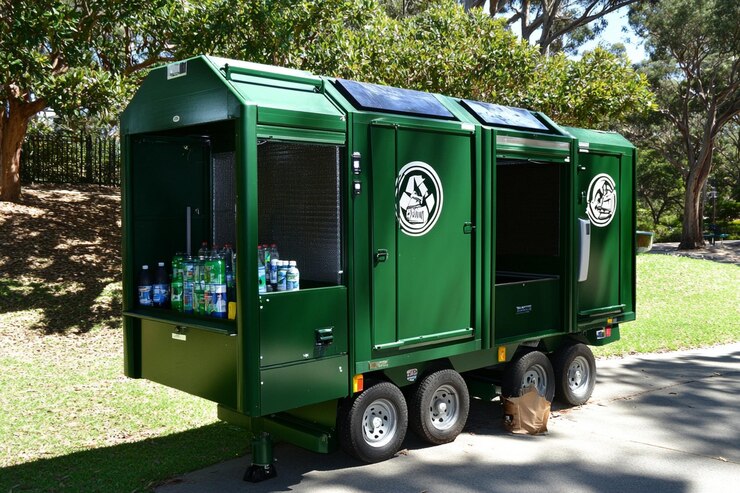As urban populations grow and environmental concerns rise, cities are continually seeking innovative solutions to enhance waste management systems. One promising approach combines solar-powered waste bins with mobile applications, creating a dynamic ecosystem that maximizes efficiency and sustainability. By integrating technology into waste management, cities can streamline collection processes, reduce operational costs, and promote eco-friendly practices. This article explores the synergy between solar-powered waste bins and mobile apps and their transformative impact on waste management systems, while also drawing parallels with industrial garbage compactor that further enhance efficiency.
The Role of Solar-Powered Waste Bins
Solar-powered waste bins are designed to harness solar energy to operate features that improve waste collection and disposal. These bins often come equipped with:
- Compaction Technology: Many solar bins are equipped with compactors that compress waste, allowing them to hold more refuse than traditional bins. This feature reduces the frequency of collection, leading to cost savings in labor and fuel.
- Sensor Technology: Integrated sensors monitor fill levels, alerting waste management teams when bins are nearing capacity. This technology enables data-driven decisions regarding collection routes and schedules, optimizing resource allocation.
- Sustainability: By utilizing solar power, these bins operate off-grid, reducing their carbon footprint and reliance on conventional power sources. This aligns with global sustainability goals and supports green initiatives in urban settings.
The Need for Mobile Integration
The integration of mobile applications with solar-powered waste bins introduces a new layer of efficiency and communication. Mobile apps can serve various functions, including:
- Real-Time Monitoring: Waste management teams can access real-time data about bin fill levels, allowing them to prioritize collection based on need. This proactive approach minimizes overflow and enhances cleanliness in public spaces.
- Route Optimization: By analyzing data from multiple bins, mobile apps can suggest optimal collection routes, reducing fuel consumption and labor costs. Efficient routing leads to fewer vehicles on the road and decreased greenhouse gas emissions.
- User Engagement: Mobile apps can also serve as platforms for community engagement, allowing citizens to report overflowing bins or suggest locations for new bins. This participatory approach fosters a sense of ownership and responsibility among residents.
Enhancing Operational Efficiency
Integrating solar-powered waste bins with mobile apps significantly enhances operational efficiency in several ways:
- Data-Driven Decision Making: The combination of solar-powered technology and mobile apps enables waste management agencies to gather and analyze data effectively. Insights derived from this data can inform decisions about bin placement, collection frequency, and resource allocation, leading to smarter investments in infrastructure.
- Reduced Collection Costs: By utilizing compacting solar waste bins equipped with sensors, cities can decrease collection frequency. The reduction in the number of trips needed to empty bins directly translates to lower labor and fuel costs. When combined with route optimization from mobile apps, the overall operational expenses decrease substantially.
- Minimized Environmental Impact: With fewer vehicles on the road and optimized collection routes, carbon emissions associated with waste collection are significantly reduced. Additionally, the solar-powered nature of the bins means that the environmental footprint of the bins themselves is considerably lower than traditional bins.
- Improved Cleanliness and Hygiene: Real-time monitoring helps prevent overflowing bins, which can create unsightly litter and attract pests. By ensuring that bins are emptied on time, cities can maintain cleaner public spaces and enhance the quality of life for residents and visitors alike.
Case Studies of Successful Integration
Several cities around the world have already started reaping the benefits of integrating solar-powered waste bins with mobile applications.
1. San Francisco, California
San Francisco has been a pioneer in sustainable waste management practices. The city has implemented solar-powered waste bins that compress waste, along with a mobile app for real-time monitoring. The app notifies the waste management team when bins are full, significantly reducing overflow incidents and improving overall waste collection efficiency.
2. Barcelona, Spain
In Barcelona, solar waste bins equipped with sensors have been deployed in high-traffic areas. The city uses a centralized mobile app that collects data from these bins, allowing waste management authorities to adjust collection schedules dynamically. This flexibility has resulted in reduced costs and improved cleanliness in public spaces.
3. Melbourne, Australia
Melbourne’s integration of solar-powered bins with a community engagement app has encouraged citizens to participate actively in waste management. Users can report issues and track the status of their local bins, leading to increased accountability and a cleaner city environment. The app has also provided insights into waste patterns, helping city planners make informed decisions about waste infrastructure.
The Synergy with Industrial Garbage Compactors
While solar-powered waste bins and mobile apps offer a robust solution for urban waste management, they can also be complemented by other technologies such as industrial garbage compactors. These compactors are designed for high-volume waste disposal, making them suitable for larger operations like shopping malls, airports, and industrial facilities.
- Efficiency in Large-Scale Operations: Industrial garbage compactors can handle significant amounts of waste, reducing the need for frequent pickups. When integrated with solar-powered waste bins, facilities can optimize their overall waste management strategy, ensuring that both general and industrial waste are collected efficiently.
- Data Integration: Like solar bins, industrial compactors can be equipped with sensors that provide real-time data on waste levels. When combined with mobile applications, businesses can monitor waste disposal across various sites, facilitating efficient operations and resource management.
Challenges and Considerations
Despite the advantages, integrating solar-powered waste bins with mobile applications comes with its own set of challenges:
- Initial Investment: The upfront costs associated with purchasing and installing solar waste bins and developing mobile apps can be significant. However, cities should view these as long-term investments that will pay off through operational efficiencies and cost savings.
- Maintenance and Reliability: Solar-powered bins and mobile technologies require regular maintenance and updates to function optimally. Ensuring that both the physical infrastructure and the software remain reliable is critical for continued success.
- User Adoption: For mobile apps to be effective, user engagement is crucial. Cities must promote their apps and educate residents on how to use them effectively to maximize participation and feedback.
Future Directions
The future of waste management lies in the continued integration of technology, sustainability, and community engagement. As cities expand their use of solar-powered waste bins and mobile apps, they will likely explore further innovations, including:
- AI and Machine Learning: Utilizing AI to analyze waste generation patterns can help cities predict collection needs more accurately, allowing for even more efficient waste management systems.
- Blockchain for Transparency: Implementing blockchain technology could enhance transparency and traceability in waste disposal, building trust between citizens and waste management authorities.
- Collaboration with Private Sectors: Partnerships between cities and technology companies can foster innovation, leading to the development of advanced waste management solutions tailored to specific urban needs.
Conclusion
Integrating solar powered waste bins with mobile applications represents a significant advancement in efficient waste management practices. This combination not only enhances operational efficiency and reduces costs but also promotes sustainability and community engagement. By harnessing technology, cities can transform their waste management systems into more responsive, responsible, and environmentally friendly operations. Moreover, when combined with industrial garbage compactors, the overall waste disposal ecosystem becomes even more efficient, providing comprehensive solutions to meet the challenges of modern urban environments. As cities continue to adopt these technologies, they pave the way for cleaner, smarter, and more sustainable communities.










 /home/u448362301/domains/theexpotab.com/public_html/wp-content/themes/foxiz/templates/popup.php on line 167
/home/u448362301/domains/theexpotab.com/public_html/wp-content/themes/foxiz/templates/popup.php on line 167